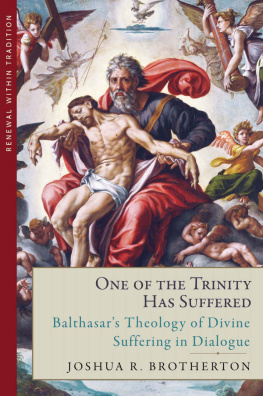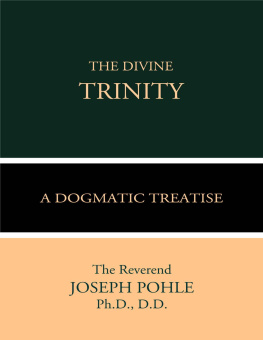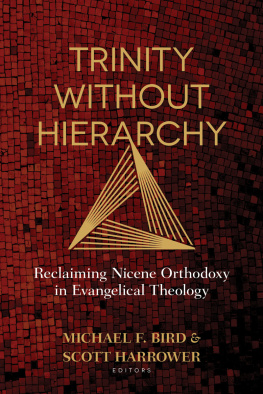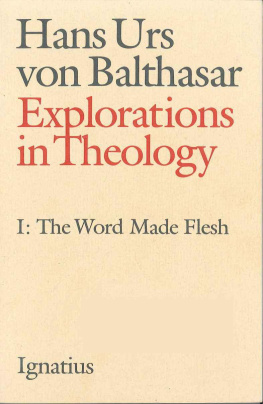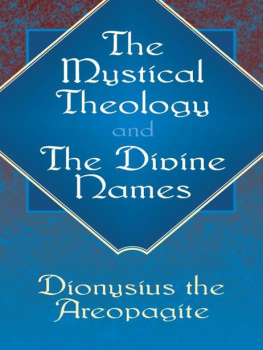PRAISE FOR ONE OF THE TRINITY HAS SUFFERED
Hans Urs von Balthasars speculations on Christs descent into hell and its significance for the Trinity have been celebrated by some as epochal insights and denounced by others as bordering on heresy. Joshua Brotherton admirably avoids partisan extremes in this careful and penetrating analysis. Displaying a striking command of the issues and literature, Brotherton sympathetically lays out Balthasars important contribution, but does not shy away from fundamental criticism.
Michael Root
Catholic University of America

Joshua Brothertons reading of Balthasars reflection on the Trinity from a Thomistic point of view is at once fundamentally appreciative and critical, in equal parts surprisingly positive and bracing. At no time does one doubt his grasp of those theological points that divide Aquinas from Balthasar. Yet marking disagreements is in the service of staging a genuine encounter between two theologians who are an expression and fruit of the Church. The encounter needs to continue.
Cyril ORegan
University of Notre Dame

With breadth of vision, Brotherton orients the reader to the state of this highly relevant question and stimulates further debate. Reading Balthasar in light of Maritain and others, he attempts a critical and broadly Thomistic appropriation of central elements of Balthasars thought. Through a complex negotiation, Brotherton seeks to retrieve Balthasars essential view of Christs salvific suffering, while resisting Balthasars projection of kenosis into the Trinity itselfa problem he perceptively traces to Balthasars lack of an adequate theory concerning the relationship of grace and freedom.
Robert J. Matava
Christendom College

RENEWAL WITHIN TRADITION
SERIES EDITOR: MATTHEW LEVERING
Matthew Levering is the James N. and Mary D. Perry Jr. Chair of Theology at Mundelein Seminary. Levering is the author or editor of over thirty books. He serves as coeditor of the journals Nova et Vetera and the International Journal of Systematic Theology.
ABOUT THE SERIES
Catholic theology reflects upon the content of divine revelation as interpreted and handed down in the Church, but today Catholic theologians often find the scriptural and dogmatic past to be alien territory. The Renewal within Tradition Series undertakes to reform and reinvigorate contemporary theology from within the tradition, with St. Thomas Aquinas as a central exemplar. As part of its purpose, the Series reunites the streams of Catholic theology that, prior to the Council, separated into neo-scholastic and nouvelle theologie modes. The biblical, historical-critical, patristic, liturgical, and ecumenical emphases of the Ressourcement movement need the dogmatic, philosophical, scientific, and traditioned enquiries of Thomism, and vice versa. Renewal within Tradition challenges the regnant forms of theological liberalism that, by dissolving the cognitive content of the gospel, impede believers from knowing the love of Christ.
PUBLISHED OR FORTHCOMING
Reading the Sermons of Thomas Aquinas: A Beginners Guide
Randall B. Smith
The Culture of the Incarnation: Essays in Catholic Theology
Tracey Rowland
Self-Gift: Humanae Vitae and the Thought of John Paul II
Janet E. Smith
On Love and Virtue: Theological Essays
Michael S. Sherwin, O.P.
Aquinas on Beatific Charity and the Problem of Love
Christopher J. Malloy
Christ the Logos of Creation: Essays in Analogical Metaphysics
John R. Betz
The One Church of Christ: Understanding Vatican II
Stephen A. Hipp
O Lord, I Seek Your Countenance:
Explorations and Discoveries in Pope Benedict XVIs Theology
Emery de Gal
The Trinitarian Wisdom of God: Louis Bouyer on the God-World Relationship
Keith Lemna
ONE OF THE TRINITY
HAS SUFFERED
ONE OF THE TRINITY
HAS SUFFERED

Balthasar's Theolog y of
Divine Suffering in
Dialogue
JOSHUA R. BROTHERTON

Steubenville, Ohio
www.emmausacademic.com

Steubenville, Ohio
www.emmausacademic.com
A Division of The St. Paul Center for Biblical Theology
Editor-in-Chief: Scott Hahn
1468 Parkview Circle
Steubenville, Ohio 43952
(c) 2019 Joshua R. Brotherton
All rights reserved. Published 2019
Printed in the United States of America
Library of Congress Cataloging-in-Publication Data
Names: Brotherton, Joshua R., 1984-author.
Title: One of the Trinity has suffered : Balthasar's theology of divine suffering in dialogue / Joshua R. Brotherton.
Other titles: Reclaiming Hans Urs von Balthasar's theodramatic eschatology
Description: Steubenville, Ohio : Emmaus Academic, [2019] | Series: Renewal within tradition | Revision of author's thesis (doctoral)--Catholic University of America, 2015, titled Reclaiming Hans Urs von Balthasar's theodramatic eschatology : revisions from Jacques Maritain, Joseph Ratzinger, and Bernard Lonergan. | Includes bibliographical references. | Summary: "The goal of this volume is to revise Hans Urs von Balthasar's theology of divine suffering, that is, his disputed discourse on the descent of Christ into hell and its implications for the Triune God, according to a robust contemporary Catholic theology. In order to accomplish such an appropriation, I have recourse not only to twentieth-century Thomistic theology, but also to the thought of Pope Emeritus Benedict XVI (Joseph Ratzinger) and Pope St. John Paul II. I seek to engage the best of the vast relevant secondary literature on Balthasar and to offer a balanced assessment of his work on the topic of divine suffering, both critical and appreciative in different respects. I argue for a peculiar interpretation of Balthasar's take on Holy Saturday and for a more refined use of language in theological discourse than is typical of his sometimes-hyperbolic style. Recognizing his laudable attempt to integrate mystical spirituality and systematic theology, I seek to distinguish valid insights from confused mixtures of metaphorical, meta-symbolic, and philosophical (metaphysical) discourse on God, particularly, with respect to the classical problem of how the Creator who willed to become incarnate may be said to suffer. Truly, "One of the Trinity has suffered," and yet this is mystery of faith that ought to be carefully explained and understood in conformity with sustained Catholic reflection on divine immutability and simplicity, the dual nature and unique personhood of Christ, the Trinity of divine subsistent relations, the freedom of God in creating and becoming man, the analogy of being, the problem of evil, and the immensity and infinite value of Christ's redemptive suffering"--Provided by publisher.
Next page
